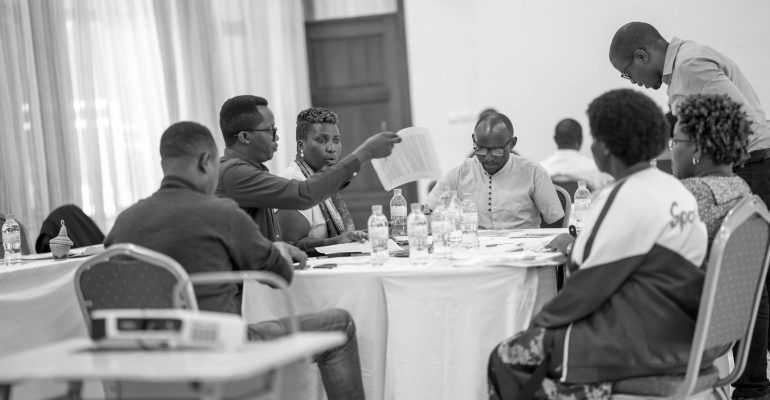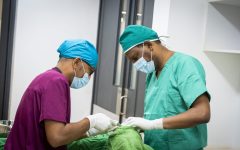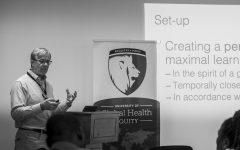Equi-Injury: A Global Effort to Treat Injuries
June 25, 2025 2025-06-25 13:54Equi-Injury: A Global Effort to Treat Injuries

Equi-Injury: A Global Effort to Treat Injuries
What happens after an injury on a road, in a home, or at work, can shape someone’s life forever. Yet, in many parts of the world, especially in low- and middle-income countries (LMICs), the path to healing is not always fair or accessible. That’s what inspired the launch of Equi-Injury, a global collaborative research project seeking Equitable Access to Quality Health Care for Injured People.
Funded by the National Institute for Health and Care Research (NIHR), University of Global Health Equity (UGHE) collaborates with University of Birmingham, University of Rwanda (UR), and other partners. The project is dedicated to ensuring that everyone, no matter where they live, has access to quality injury care.
Unlike usual studies, Equi-Injury offers a participatory action research approach, bringing together different stakeholders. Injury survivors, healthcare providers, and policymakers collaborate during research to address key issues.
The study involves four countries: Rwanda, Ghana, Pakistan, and South Africa. In these countries, injuries cause about one in ten deaths. This includes 7% of deaths in Pakistan, 8% in Ghana, 9% in Rwanda, and 13% in South Africa. Nevertheless, the bigger question is money. In LMICs, a major hurdle after an injury is often the financial strain. This is critical as healthcare access faces obstacles like out-of-pocket costs, limited insurance, resource disparities, and poor injury dataThe main goal of the Equi-Injury project is, among others, to generate evidence for equitable quality injury care policies.
“We are generating evidence, on community priorities and create a sustainable impact. This approach contrasts conventional research, where questions are formulated without adequate community input, often yielding results that fail to meaningfully benefit the studied population.” Dr. Derbew Fikadu Berhe, faculty and a Post Doctoral Research Fellow for the Equi-Injury project at UGHE, says.
Equi-Injury is built on three pillars: research, community engagement, and capacity building. Research focuses on understanding how injury care is provided – or is not in real life. Community engagement ensures local voices shape the solutions to the identified issues. Capacity building is about training the next generation of researchers and healthcare leaders.
To define equitable quality care in the context of injury, the Equi-Injury project uses three main ideas to guide its work: the four-delay model, the WHO’s six health system building blocks, and the Institute of Medicine (IoM) quality care model. The IoM model focuses on six areas of quality care: effectiveness, timeliness, safety, equity, and patient-centeredness. The project is using a mixed-method data collection approach (quantitative and qualitative).
To understand the barriers and facilitators to quality injury care policy and services in four LMICs, the Equi-Injury project team is gathering insights from injured patients, community members, healthcare providers, and policymakers through patient chart reviews, interviews, Focused Group Discussions, and workshops.
What stands out is their willingness to stay involved in the project, even after their formal participation ends. They want to be part of making changes happen.
Rwanda’s effort to improve healthcare delivery is also evident in this project. The Ministry of Health, through Rwanda Biomedical Centre collaborates and participates integrally. In addition, hospital facility managers and district public health general managers are the main entry point to the community.
The current phase of Equi-Injury is focused on research, but the team is already planning the next step: putting what they’ve learned into action. A new proposal for an implementation phase, which depends on the potential funder. In the meantime, dissemination workshops are planned so communities can see what their participation has contributed to.
The lessons from this project don’t stop at national borders. The team envisions a future where this model can be adapted and scaled up in other countries, especially where health systems face similar challenges.
UGHE is proud to be part of this participatory research initiative, which aligns closely with our promise to strengthen health systems and deliver equitable care to the most vulnerable. As a global health university driven by a commitment to communities, we prioritize their lived experiences, especially those left behind. This research project mirrors what we stand for by creating a space for victims, healthcare providers, and policymakers to engage in open, inclusive dialogue.
By participating in this collaborative effort, UGHE not only contributes academic and research expertise, but also reinforces the belief that sustainable health outcomes are achieved when communities are active partners in shaping health systems meant to serve them.







